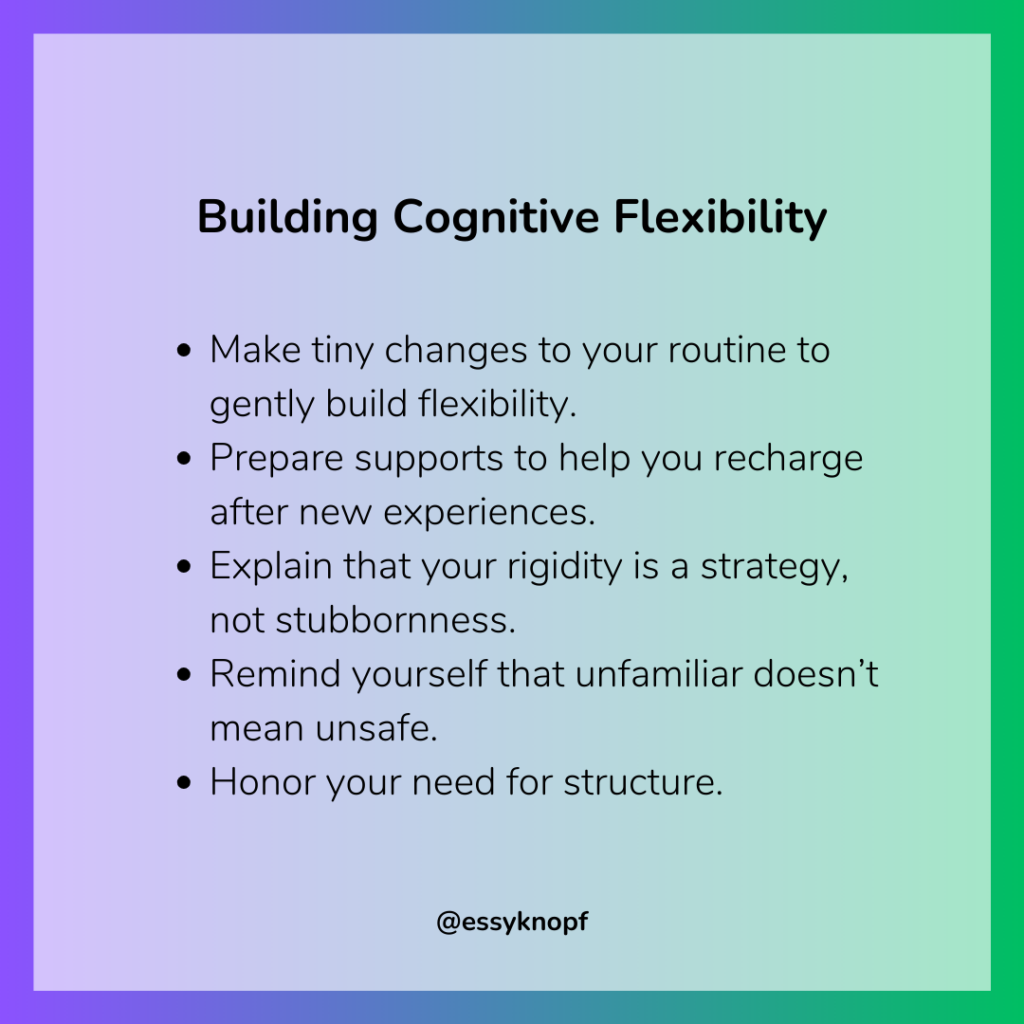Neurodivergent cognitive rigidity: Why change feels so hard
“Why can’t you just be more flexible?”
If you’re neurodivergent (ND), you’ve probably heard that more than once. But what others call “rigid” is often cognitive rigidity—a form of mental patterning that offers predictability, structure, and safety in an unpredictable world.
And for many autistic and ADHD folks, that predictability isn’t optional. It’s survival.
What Is Cognitive Rigidity?
Cognitive rigidity refers to difficulty shifting thoughts, routines, or expectations. It can look like resisting last-minute changes, struggling to see alternate solutions, or clinging to specific preferences.
But for ND minds, cognitive rigidity is rarely about control for control’s sake. Instead, it’s a protective response to chronic stress, social shaming, sensory overload, and social unpredictability.
It’s what we lean on when everything else feels too much.
The Hidden Function of Rigidity
Rigidity often kicks in when we’re overwhelmed—especially when sensory, executive, and social bandwidths are maxed out.
NDs tend to process more stimuli and expend more energy navigating social expectations. Add in loud environments, unspoken rules, or unclear plans, and you’ve got a perfect storm.
Cognitive rigidity helps manage that chaos by narrowing the options. It simplifies things. It gives us a sense of control.
Rigidity Is Often a Response to Ableism
Let’s not ignore the broader context: we live in a world that centers neurotypical (NT) ways of thinking, communicating, and being. This structural ableism pressures us to adapt constantly—often at our own expense.
Cognitive rigidity becomes a defense against that pressure. A way to shield ourselves from environments that don’t consider our needs. A way to avoid judgment, sensory harm, or being misunderstood.
And who can blame us?

When Cognitive Rigidity Backfires
While cognitive rigidity can be protective, it can also become restrictive.
It can keep us from trying new things, connecting with others, or growing into spaces that might actually support us—if we had the chance to ease in at our own pace.
Avoidance tends to breed more anxiety. The more we resist change, the scarier it can feel. And the more our world shrinks, the more isolated we may become.
Building Gentle Flexibility (Without Forcing It)
Flexibility doesn’t mean abandoning your structure. It means expanding it—gently and intentionally.
Here’s how:
- Start Small: Try a slight variation in your routine. Go to a familiar café but order something different. Change doesn’t have to be dramatic to count.
- Plan for Recovery: Know that new experiences might drain you. Have supports in place—noise-canceling headphones, alone time, or a sensory toolkit.
- Talk About It: Let others know that cognitive rigidity isn’t stubbornness—it’s strategy. When people understand your needs, they’re more likely to accommodate them.
- Challenge Catastrophizing: Notice when your brain jumps to worst-case scenarios. Remind yourself: “This is unfamiliar, not dangerous.”
- Practice Self-Compassion: You’re not broken for needing structure. You’re wise for learning how to protect yourself in a world that often doesn’t.
A New Way to Think About Cognitive Rigidity
What if we reframed rigidity not as a flaw—but as wisdom born from experience?
Because that’s what it is. It’s your brain doing its best to keep you safe.
And yes, while safety matters, so does the freedom to grow, connect, and explore.
If we can meet ourselves with gentleness, communicate our needs clearly, and take tiny, intentional steps toward flexibility, we can start to expand our world—without abandoning ourselves.
How does cognitive rigidity show up in your life?

Essy Knopf is a therapist who likes to explore what it means to be neurodivergent and queer. Subscribe to get all new posts sent directly to your inbox.
© 2026 Ehsan "Essy" Knopf. Any views or opinions represented in this blog are personal and belong solely to the blog owner and do not represent those of people, institutions or organizations that the owner may or may not be associated with in professional or personal capacity, unless explicitly stated. All content found on the EssyKnopf.com website and affiliated social media accounts were created for informational purposes only and should not be treated as a substitute for the advice of qualified medical or mental health professionals. Always follow the advice of your designated provider.


